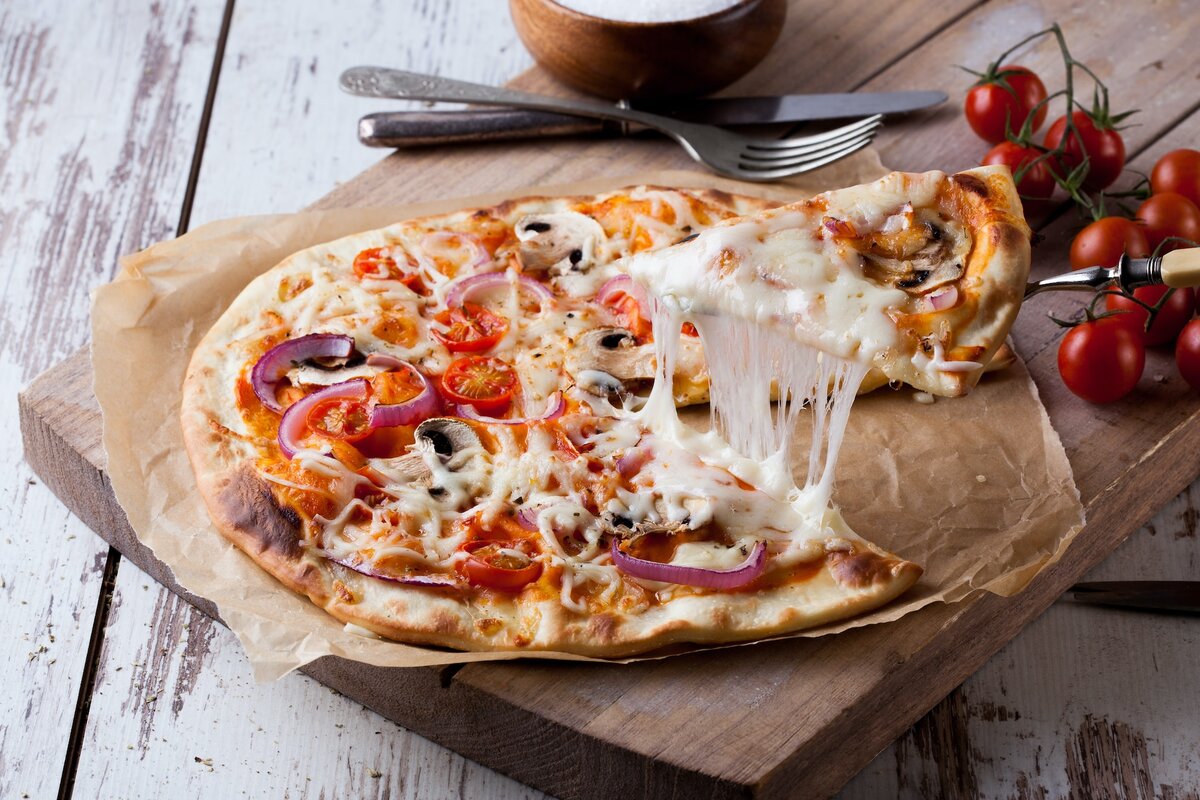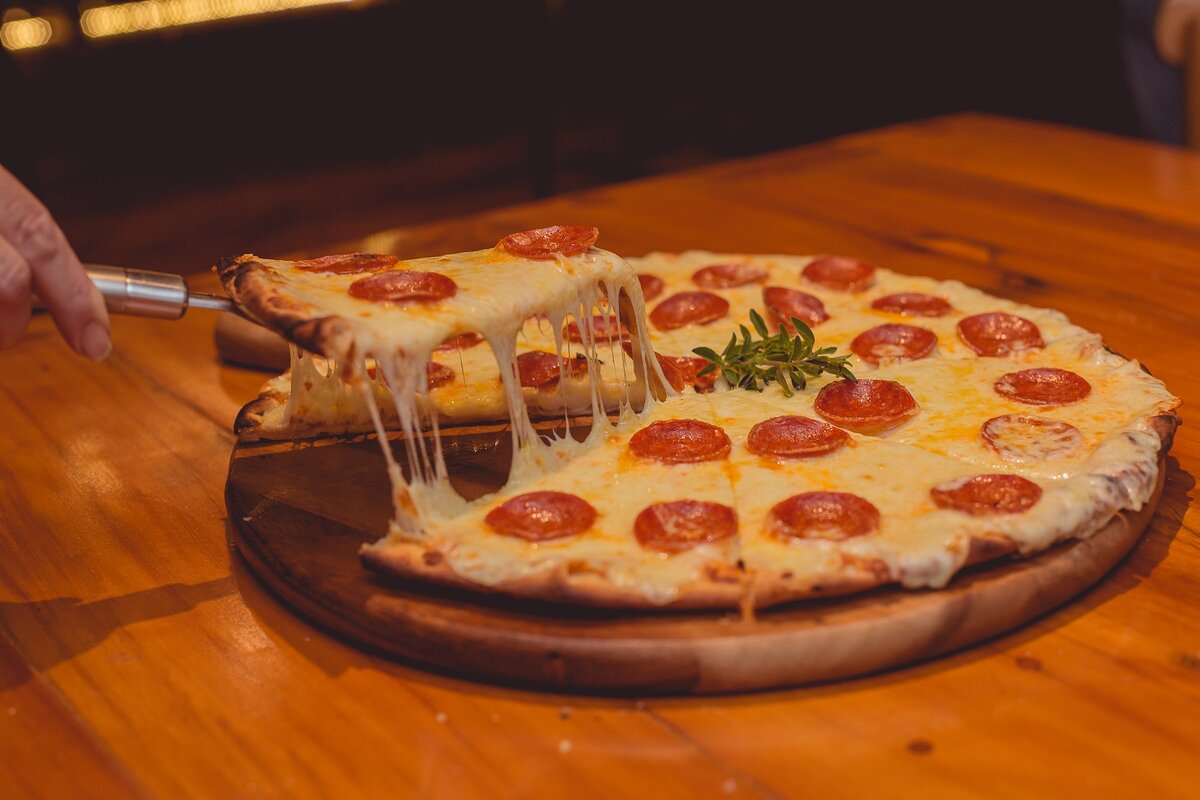Bulking up isn’t just about lifting weights – it’s also about what you eat. Nutrition plays a crucial role in muscle gain, providing the building blocks for new muscle tissue and the energy for intense workouts. While protein is often at the forefront of a bulker’s mind, the question arises: ‘is pizza good for bulking’ due to its carbohydrates and fats? Understanding how to fuel your body effectively is key to a successful bulking phase. Now, let’s chew over the idea of fitting pizza into this nutritional puzzle.
On this page:
Demystifying the Pizza: Nutritional Breakdown for Bodybuilders
When bodybuilders think of bulking foods, pizza isn’t often the first meal that comes to mind. However, understanding what’s in a slice can be useful when considering it as part of a bulking diet. Pizza, in its basic form, consists of three main components: crust, sauce, and cheese. These elements can deliver a mix of macronutrients – carbs, protein, and fats.
The crust serves as a significant source of carbohydrates, which are essential for replenishing glycogen stores and aiding in recovery after intense workouts. The dough’s carbohydrate content helps fuel workouts and foster muscle growth when paired with adequate protein intake.
Tomato sauce adds not just flavor but also a modest amount of vitamins and minerals, including vitamin C and potassium. However, it’s the cheese that brings in a considerable amount of protein and fat. Protein is crucial for muscle repair and growth, making it a key nutrient for bodybuilders. The fat content, while higher in calories, also plays a role in hormone production, which is vital for muscle development.
Commercial pizzas can vary vastly in their nutritional profiles, depending on the type of crust, the amount and type of cheese, and additional toppings. While a standard slice of cheese pizza from a large chain may provide about 10-12 grams of protein, which is beneficial for muscle synthesis, it also comes with a substantial calorie load primarily from the fats and refined carbs.
Not all pizzas are created equal. Considering the high calorie count from added oils, sugars, and processed ingredients, one might ask, ‘is pizza good for bulking’ when trying to avoid unwanted fat gain? Conversely, homemade or carefully chosen pizzas with a whole grain crust, reduced-fat cheese, and lean protein toppings can offer a more balanced nutritional profile suitable for bodybuilders focusing on muscle gain without excessive fat increase.
Is Pizza Good for Bulking: Understanding Its Role
Pizza, at its core, is a source of dense calories, providing the energy necessary to fuel workouts and muscle recovery. With its combination of carbohydrates from the crust, proteins from cheese and potential meat toppings, and fats from cheese and various toppings, some may wonder ‘is pizza good for bulking’ because it delivers a balance of macronutrients.
The carbohydrate content in pizza is particularly beneficial for replenishing glycogen stores, which can be depleted after intense training sessions. This is crucial for muscle recovery and growth, as glycogen is the primary energy source used during weightlifting. Additionally, the protein in the cheese and meats aids in muscle repair. While the protein content in a typical slice may not be as high as in other protein-rich foods, when eaten in larger quantities, pizza can contribute a significant amount of protein to one’s daily intake.
The fats found in pizza, especially if it includes toppings like olives or certain meats, provide a sustained source of energy, which is vital for those engaging in long, strenuous workouts. These fats can also help with hormone production, including testosterone, which plays an essential role in muscle building.
Another pro is the sheer variety of pizza available. This diversity makes it easier to include pizza in a bulking diet without becoming monotonous. Bodybuilders can choose from a range of toppings to increase the nutritional value and cater to their specific needs, whether it’s adding extra chicken for more protein or loading up on vegetables for additional vitamins, minerals, and fiber.

The psychological benefit of incorporating a favorite food like pizza into a diet cannot be overlooked. The enjoyment of eating pizza can help maintain motivation and adherence to a bulking diet, leading one to ponder ‘is pizza good for bulking’ for its psychological benefits. The satisfaction derived from a delicious slice of pizza might just be the comfort needed to stay on track with dietary goals.
Potential Pitfalls of Pizza on Muscle Gain
While pizza might be a tempting option for those looking to increase their calorie intake during a bulking phase, it’s important to recognize the potential pitfalls that can come with it in the context of muscle gain. Pizza is often high in saturated fats and simple carbohydrates, which can lead to unwanted fat gain instead of muscle. These fats are not the heart-healthy kind, which raises the question ‘is pizza good for bulking,’ especially considering potential negative impacts on cholesterol levels.
Pizza can be quite calorie-dense with limited nutritional diversity, meaning that while it provides energy, it lacks in essential nutrients like vitamins and minerals necessary for optimal muscle recovery and growth. This can also lead to imbalances in your diet, which might crowd out more nutrient-dense foods that are crucial for building lean muscle.
The high sodium content in most commercial pizzas is another concern. Sodium can cause water retention, making it hard to track true progress as your body weight fluctuates. Also, too much sodium over time can lead to higher blood pressure, which is not conducive to overall health.
Pizza also has a high glycemic index, especially if it’s made with white flour. This means it can cause a rapid spike in blood sugar levels followed by a quick drop, which can lead to energy crashes and may hinder your performance during workouts.
Consuming pizza regularly can condition your palate to crave more processed and high-fat foods, which can make adhering to a disciplined bulking diet more challenging. It may also contribute to an unhealthy relationship with food where highly palatable, calorie-rich foods become a staple, making it difficult to maintain a balanced diet in the long term.
Optimizing Pizza for Bulking: Timing and Frequency
‘Is pizza good for bulking’ becomes a pertinent question when thinking about optimizing pizza for muscle gain in relation to workout timing. Consuming a pizza meal after an intensive training session can take advantage of the body’s anabolic window. This is a period, usually within 30 to 45 minutes post-workout, when your body is more efficient at absorbing carbs and protein to repair muscles and replenish energy stores.

However, the frequency of pizza indulgences should be moderated. While it’s packed with calories that can contribute to a caloric surplus required for bulking, having it too often can lead to an excessive intake of saturated fats and processed components, which are not ideal for overall health or muscle building. Aim for a balance by integrating pizza into your meal plan no more than once or twice a week, depending on your specific calorie and nutrient needs.
It’s also essential to consider the timing of pizza meals in your overall diet. If you’re eating pizza on a rest day, it’s wise to have it earlier in the day, giving your body more time to utilize these calories throughout the day rather than immediately before a period of inactivity, like bedtime. This way, you’re less likely to store the excess calories as fat. While pizza can be a part of a bulking diet, one must strategically consider ‘is pizza good for bulking’ to maximize muscle gain and minimize unwanted fat storage.
Selecting the Best Pizza Toppings for Muscle Building
High-quality protein is paramount for muscle repair and growth. Toppings like grilled chicken, turkey, lean beef, or even tofu pack a protein punch. Accompany these with a sprinkle of low-fat cheese to add casein and whey proteins into the mix without excessive saturated fat.
Beyond protein, considering ‘is pizza good for bulking,’ select vegetables high in micronutrients to top your pizza for added nutritional benefit. Options like spinach, bell peppers, mushrooms, and onions contribute essential vitamins and minerals, while also providing fiber that aids digestive health. These fibrous vegetables add bulk and nutrition without too many additional calories.
While it’s tempting to add more cheese or cured meats for flavor, these can quickly escalate the calorie and saturated fat content without providing the balanced nutrition required for muscle growth. Instead, consider using herbs and spices like oregano, garlic, and chili flakes to enhance taste without compromising health.
If you’re craving a richer flavor, a modest amount of healthy fats can be beneficial. Consider a drizzle of olive oil post-baking for unsaturated fats, or a few slices of avocado, which can offer both heart-healthy fats and a creamy texture.
Consider the base of your pizza as an opportunity to sneak in more nutrients. A whole-grain crust will offer more fiber and a better nutrient profile than a standard white flour base, supporting overall health and muscle recovery.
Eating Pizza After Workout: A Balanced Approach
To successfully include pizza in your diet while considering ‘is pizza good for bulking,’ treat it as an occasional meal rather than a staple. On days when you have pizza, aim to balance your other meals with nutrient-rich foods such as lean proteins, whole grains, fruits, vegetables, and healthy fats. This ensures that while you’re considering ‘is pizza good for bulking,’ you’re not only getting the necessary calories but also the vitamins and minerals vital for muscle repair and overall health.
When you do indulge in pizza, think about portion control. A slice or two can be part of a bulking diet, but consuming an entire pizza in one sitting can lead to excessive intake of saturated fats and sodium, which could be counterproductive in the long run. By being mindful of how much you eat, you can enjoy pizza without overdoing it.
Consider the timing of your pizza meal. Eating pizza after workout can take advantage of the body’s heightened state of nutrient absorption, making it a strategic move for post-exercise nutrition. The combination of carbohydrates and proteins can aid in muscle recovery and growth if consumed during this optimal window.
While pizza may have a place in your bulking plan, it’s critical to focus on the quality of the pizza itself. Opt for homemade or healthier restaurant options that will allow for better control over the ingredients, reducing the likelihood of consuming unhealthy additives and preservatives.
Expert Tips for Healthier Pizza Alternatives
When considering ‘pizza for bulking,’ opt for whole grain or cauliflower crusts to increase fiber content, aiding digestion and providing slower energy release. This can help manage blood sugar levels and sustain energy for workouts.
Cheese is a staple of pizza but can be high in saturated fat. Choosing part-skim mozzarella or even adding a sprinkle of nutritional yeast for a cheese-like flavor can reduce fat intake while still providing protein. Nutritional yeast also has the benefit of B-vitamins, which are essential for energy metabolism.
Toppings are an easy way to customize and boost the health profile of a pizza. Load up on vegetables like bell peppers, onions, mushrooms, and spinach to add vitamins, minerals, and antioxidants without significantly increasing calorie density. Lean meats such as grilled chicken or turkey provide a solid protein boost without the excess fat of pepperoni or sausage.
Sauces can be a hidden source of sugar and calories. Tomato sauce is a healthier choice, especially if it’s low in sugar and sodium. Alternatively, a pesto base made with basil, garlic, pine nuts, and a touch of olive oil can offer heart-healthy fats and a rich flavor profile.
Portion control is key. Enjoying a couple of slices of a healthier pizza option, paired with a side salad or steamed vegetables, can make for a satisfying meal that supports muscle growth without overdoing it on calories or processed ingredients. This balance ensures that pizza can fit into a bulking diet while still catering to overall health and fitness goals.
Balancing Enjoyment and Nutrition for Effective Bulking
In conclusion, when it comes to bulking, pizza can be both a friend and a foe. It’s clear that enjoyment and nutrition don’t have to be mutually exclusive. By choosing the right toppings and being mindful of frequency, pizza can fit into a balanced bulking diet. Remember, the key is moderation and strategic planning. Incorporate pizza as a part of a varied diet rich in protein, whole grains, and vegetables to satisfy your cravings without compromising your fitness goals. Ultimately, bulking is about fueling your body effectively for muscle growth and recovery, and with the right approach, pizza can be part of that journey. Keep these points in mind, and you’ll be able to enjoy your favorite slice while staying on track with your bulking objectives.
